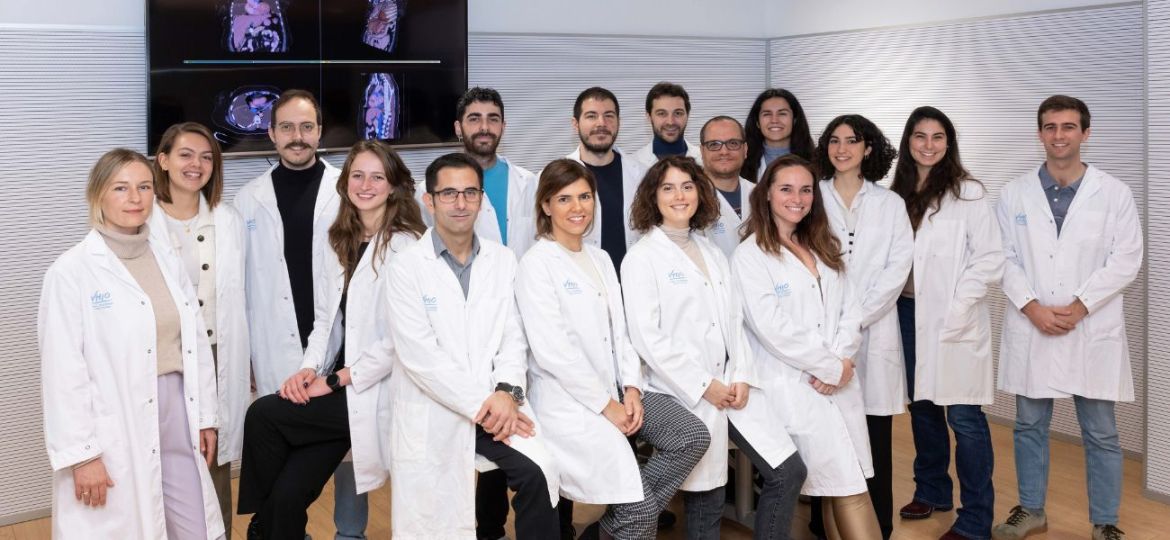
- Reported today at the ESMO Congress 2023 in Madrid, results of a VHIO prospective study point to the promise of multiparametric magnetic resonance imaging as a non-invasive approach for assessing the tumor microenvironment and predicting response to immune checkpoint inhibitors (ICIs) in advanced solid tumors.
- Presented by VHIO’s Kinga Bernatowicz during a Mini Oral session, data suggest that mpMRI could be used as a novel approach to better guide patient selection for treatment with ICIs.
Presented today at the 2023 Congress of the European Society for Medical Oncology (ESMO), 20-24 October in Madrid, results of a prospective study* led by investigators at the Vall d’Hebron Institute of Oncology (VHIO), Vall d’Hebron Campus, point to multiparametric magnetic resonance imaging (mpMRI) for assessing the tumor microenvironment and predicting response to immune checkpoint inhibitors (ICIs) in patients with advanced solid tumors.
Immune-based therapies including ICIs continue to revolutionize the treatment of an increasing number of tumor types, however robust biomarkers of response to better guide patient selection in early phase trials and clinical practice are lacking.
Researchers of VHIO’s Radiomics Group directed by Raquel Perez-Lopez, in collaboration with our Early Clinical Drug Development, Molecular Oncology, and Biomarkers and Clonal Dynamics Groups—led by Elena Garralda, Paolo Nuciforo and Rodrigo Toledo, respectively—have evaluated the use of mpMRI as a new approach to identify those patients who would be most likely to derive benefit from treatment with ICIs. Using MRI imaging, they prospectively assessed 146 tumors from 40 patients to identify new response markers to improve to stratify patient outcomes.
“Using various contrast techniques, we analyzed images collected by multiparametric magnetic resonance imaging at the beginning of the study to obtain 11 parameters describing tumor microstructure, as well as 23 tumor biopsies obtained before the start of treatment,” explains first author Kinga Bernatowicz, a Postdoctoral Researcher of VHIO’s Radiomics Group, who presented results of this study* today at the ESMO Congress 2023.
“Our results show that multiparametric magnetic resonance imaging provides valuable information about advanced solid tumor microstructure and may serve as useful tool for patient selection for treatment with immunotherapy,” adds lead investigator Raquel Perez-Lopez.
While further studies are warranted to validate these findings, this imaging technique could help to identify a subset of progressing patients resistant to ICIs, who would be candidates for other therapies.
“Advancing cancer biomarker discovery will allow us to deliver on the true promise of precision oncology for an increasing number of people with cancer as well as ultimately improve the survival and quality of life of our patients,” concludes Perez-Lopez.
This research is based on prospective analysis of the PREDICT study supported by AstraZeneca and the CRIS Cancer Foundation.
###
*Abstract reference and session details:
1023MO – Decoding Immunotherapy Resistance: A Novel Multiparametric Magnetic Resonance Imaging Approach to Stratify Cancer Patient Outcomes. K. Bernatowicz, F. Grussu, C. Tozzi, A. Voronova, M. Sanz, M. Vieito Villar, G. Alonso Casal, V. Galvao, A. Oberoi, I. Braña, O. Saavedra Santa Gadea, E. Muñoz Couselo, G. Serna, A.B. Moreno, M. Rotxes, J. Tabernero, R. Toledo, P. Nuciforo, E. Garralda, R. Perez Lopez.
ESMO Congress 2023, 20 – 24 October, Madrid, Spain
Session Type: Mini oral session – Investigational immunotherapy
Date: Saturday, 21 October 2023
Session time: 16:30 – 17:50
Chairs: Alessandra Curioni-Fontecedro (Villar sur Glane, Switzerland), María José De Miguel (Madrid, Spain)
Room: Málaga Auditorium – Hall 10

























